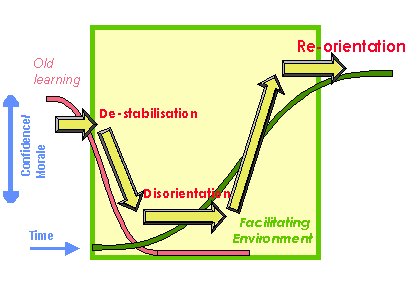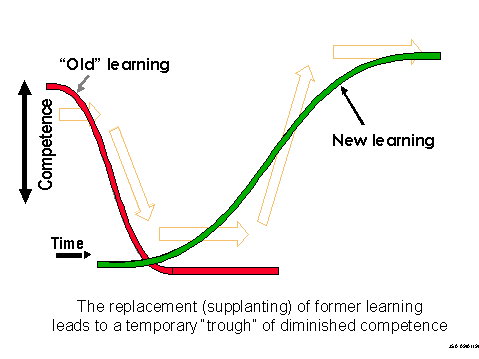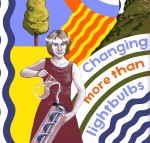There’s quite a lot of talk about the climate change “value-action gap” – people (and governments and businesses) saying one thing, and doing another.
If we resist changing our ways, it may be because we have to pay a high cost for changing. Not a money cost, but a psychological cost. Changing our ways can mean we have to replace what we already know with new knowledge and skills. In the process of switching from one to the other, we can feel like incompetent idiots. This can stop us completing the learning process. Instead, we go back to our old ways.
Why is it hard for an old dog to learn new tricks?
Source: http://learningandteaching.info/learning/resistan.htm
Three stages of changing our ways
- destabilisation – previous ways of doing things are upset
- disorientation – in the “trough”, feeling demoralised and incompetent, which can make you feel like going back to your old ways
- re-orientation – gradually climbing back up to your old sense and level of competence and morale, with new skills and knowledge and ways of doing things.
For a competent adult to change their ways, they have to question and replace previous ways of doing things. This is hard enough if you choose to do it. When changing your ways is demanded or required or creeps up on you through social or advertising pressures, you can find yourself resisting it. You can also resist it when you are emotionally attached to your existing ways of doing things. (This may be an argument against government behaviour change programmes.)
Does this apply to climate change reduction issues?
I think this idea about why it’s hard for competent adults to change their ways is interesting, but I also have doubts about how useful it is as an explanation of the “value-action” gap – between what people (and governments) say about their interest in reducing climate change, and what they actually do about it.
This is because I think climate change is a political issue that needs political solutions – not something that individuals can solve by changing their ways.
So I’ll be looking for more political explanations of the “value-action” gap, particularly in relation to governments that say one thing but fail to deliver it.
Which is the whole story of climate change policies since Kyoto, really.
How can old dogs learn new tricks?
But to conclude the information about how old dogs can learn new tricks – For the new learning to take root, people need support from somewhere.
 Source: http://learningandteaching.info/learning/resistan.htm
Source: http://learningandteaching.info/learning/resistan.htm
In case this does have a bearing on how, collectively, we can learn new ways of doing things that protect the environment and reduce climate change, I hope EnergyRoyd can help to create a supportive environment for this to happen.




